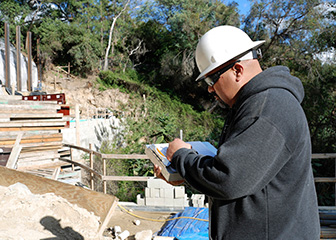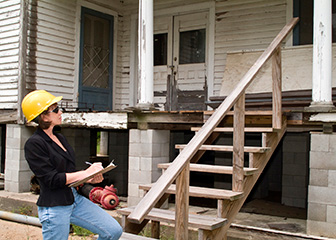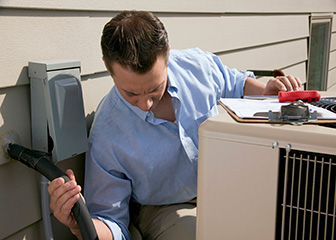What Construction and Building Inspectors Do
About this section

Home inspectors inform potential homebuyers of a home’s deficiencies.
Construction and building inspectors ensure that new construction, changes, or repairs comply with local and national building codes and ordinances, zoning regulations, and contract specifications.
Duties
Construction and building inspectors typically do the following:
- Review and approve plans that meet building codes, local ordinances, and zoning regulations
- Inspect and monitor construction sites to ensure overall compliance
- Use survey instruments, metering devices, and test equipment to perform inspections
- Monitor installation of plumbing, electrical, and other systems to ensure that the building meets codes
- Verify level, alignment, and elevation of structures and fixtures to ensure building compliance
- Issue violation notices and stop-work orders until building is compliant
- Keep daily logs, including photographs taken during inspection
Construction and building inspectors examine buildings, highways and streets, sewer and water systems, dams, bridges, and other structures. They also inspect electrical; heating, ventilation, air-conditioning, and refrigeration (HVACR); and plumbing systems. Although no two inspections are alike, inspectors do an initial check during the first phase of construction and follow-up inspections throughout the construction project. When the project is finished, they do a final, comprehensive inspection.
The following are types of construction and building inspectors:
Building inspectors check the structural quality and general safety of buildings. Some specialize in structural steel or reinforced-concrete structures, for example.
Electrical inspectors examine the installed electrical systems to ensure they function properly and comply with electrical codes and standards. The inspectors visit worksites to inspect new and existing sound and security systems, wiring, lighting, motors, and generating equipment. They also inspect the installed electrical wiring for HVACR systems and appliances.
Elevator inspectors examine lifting and conveying devices, such as elevators, escalators, moving sidewalks, lifts and hoists, inclined railways, ski lifts, and amusement rides.
Home inspectors typically inspect newly built or previously owned homes, condominiums, townhomes, and other dwellings. Prospective home buyers often hire home inspectors to check and report on a home’s structure and overall condition. Sometimes, homeowners hire a home inspector to evaluate their home’s condition before placing it on the market.
In addition to examining structural quality, home inspectors examine all home systems and features, including roofing, exterior walls, attached garage or carport, foundation, interior, plumbing, electrical, and HVACR systems. They look for and report violations of building codes, but they do not have the power to enforce compliance with the codes.
Mechanical inspectors examine the installation of HVACR systems and equipment to ensure that they are installed and function properly. They also may inspect commercial kitchen equipment, gas-fired appliances, and boilers.
Plan examiners determine whether the plans for a building or other structure comply with building codes. They also determine whether the structure is suited to the engineering and environmental demands of the building site.
Plumbing inspectors examine the installation of potable water, waste, and vent piping systems to ensure the safety and health of the drinking water system, piping for industrial uses, and the sanitary disposal of waste.
Public works inspectors ensure that federal, state, and local government water and sewer systems, highways, streets, bridges, and dam construction conform to detailed contract specifications. Workers inspect excavation and fill operations, the placement of forms for concrete, concrete mixing and pouring, asphalt paving, and grading operations. Public works inspectors may specialize in highways, structural steel, reinforced concrete, or ditches. Others specialize in dredging operations required for bridges and dams or for harbors.
Specification inspectors ensure that work is performed according to design specifications. Specification inspectors represent the owner’s interests, not those of the general public. Insurance companies and financial institutions also may use their services.
A primary concern of building inspectors is fire prevention safety. For more information, see the profile on fire inspectors and investigators.

















